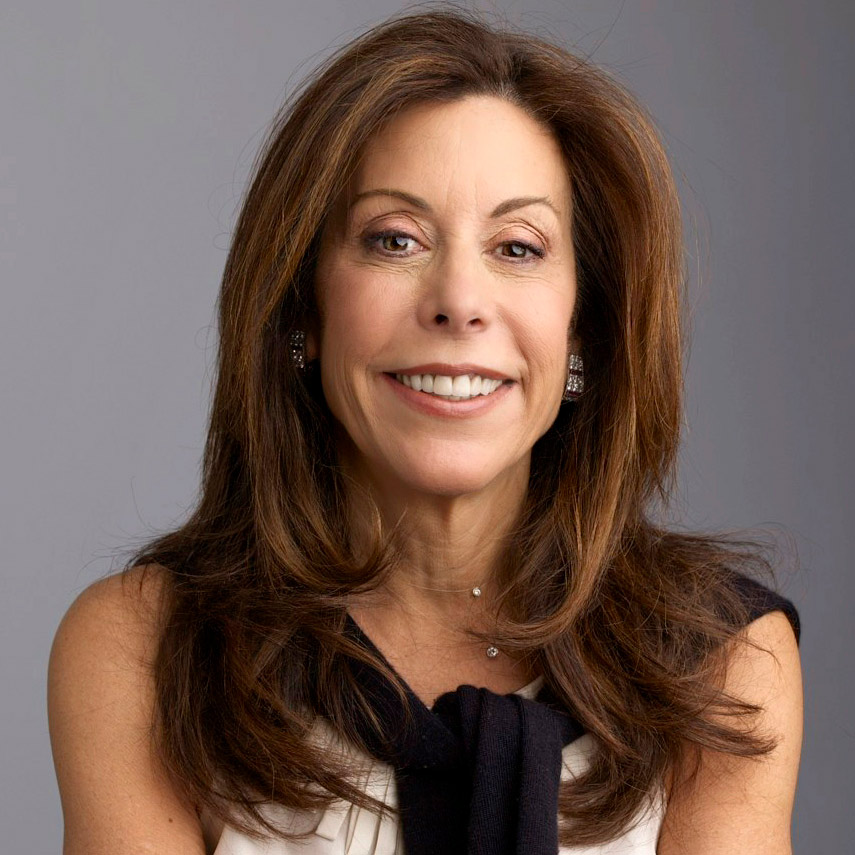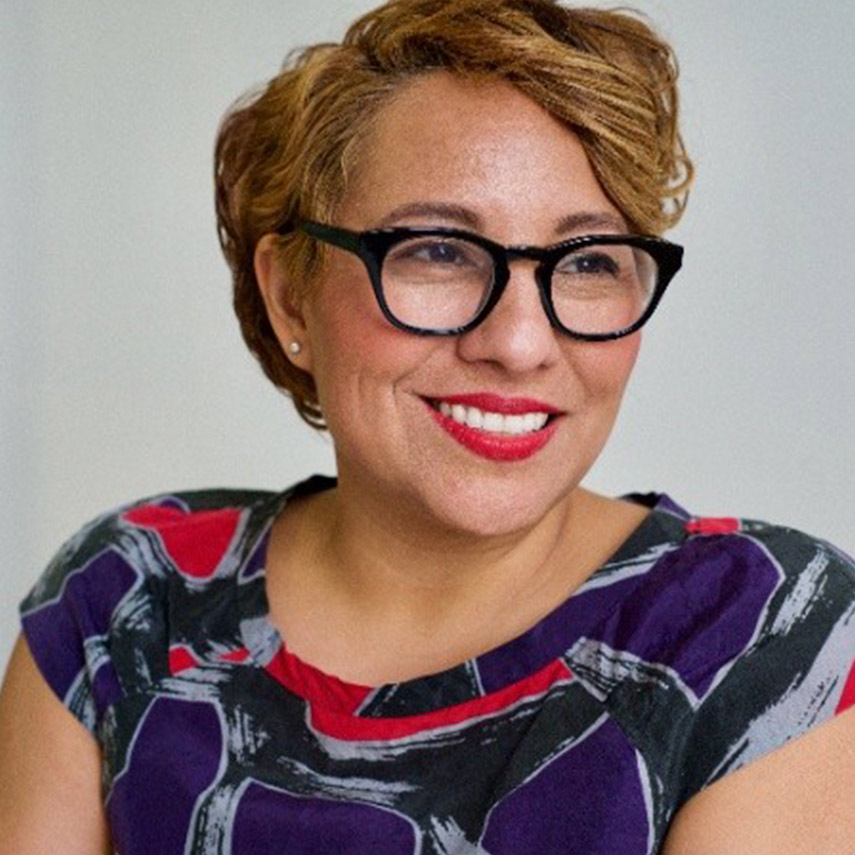The Future
is Fintech
While the markets whipsaw between record highs and resolve-testing lows, Fordham Law alumni are hard at work building the future of finance.
“I didn’t understand one word anybody said there, not one,” said Redel, who is also the only woman ever elected chairman of the board of Commodity Exchange. But she went home and read up on the subject. The more she learned, the more she saw it everywhere, with companies like Ernst & Young and Fidelity getting involved. “Before I knew it, I was knee-deep in it.”
She isn’t referring to the two framed prints backed by NFTs3—made for her by the pioneering cryptoartist Kevin Abosch—on her home office wall. In 2018, Redel developed a blockchain course at Fordham Law, soon after adding one on smart contracts, where computer code acts as a digital agreement between two parties, and another on decentralized finance, a blockchain-based ecosystem that doesn’t rely on banks or brokers for transactions.
Fittingly for such fast-evolving areas, Redel’s courses keep changing, sometimes in a matter of hours. Two years ago, she noted, she wouldn’t have had a whole class on NFTs; now she does. Earlier this year, just before a Monday morning smart contracts class in which she planned to lecture on lending, the U.S. Securities and Exchange Commission settled a lawsuit brought against BlockFi, a startup meant to look like a bank but built around digital currency. Charged with offering loan products that it failed to register as securities and with failing to register the company itself as an investment company, BlockFi agreed to a $100 million penalty as settlement. Thirty minutes before her 10:30 a.m. class, Redel popped the settlement into the class’s Telegram group.
“It’s challenging, but it’s exciting at the same time,” she said. “In 10 years, it will be an integral part of the legal, financial, and regulatory regime.”
(Always) Open for Business

Not surprisingly, nearly all of the players in the city’s financial industry, from hedge funds, to banks, to financial institutions, are exploring how to get involved, and nearly every large law firm has at least one partner working in crypto to meet client demand. Cue the ads for fintech companies covering the New York subway, while LinkNYC Wi-Fi kiosks in June alternately flashed an F. Scott Fitzgerald quote about the joys of New York summer afternoons and an ad that teased, “This could be the biggest thing in bitcoin since … bitcoin.”
The juxtaposition of the old New York of Fitzgerald and the new city of fintech is apt. After all, New York has a long history as a center of finance as well as a place of invention and modernization.
And so the crop of Fordham-trained lawyers working in fintech are using traditional financial knowledge, plus a deep and practical understanding of securities, intellectual property and contracts law, and a dash of ingenuity to write this new chapter in the city’s history.
“New ideas and competition always make legacy firms innovate and think about how to better serve customers,” Redel said. On the flip side, fintech experts can explain to financial institutions why participating in digital assets is important and how it could become an integral part of the ways people invest, she said.
Besides, where is it more fitting than in “the city that never sleeps” to drag the existing financial system—where you can’t send a wire after 5 p.m.—into the world of always open for business?
“The current financial system doesn’t really support the fact that people are always ‘go, go, go’ now,” said Erica Palaia, FCRH ’10, GSAS ’11, LAW ’14, senior counsel-partnerships at blockchain company Paxos. “Blockchain is 24/7.”
Adds Palaia, whose company’s mission is to rebuild the financial system on new technology, “New Yorkers are on the forefront of everything, and this is the next generation of finance.”

A Fruitful Bounty
Crypto, by nature, resists oversight: bitcoin’s pseudonymous creator Satoshi Nakamoto distrusted centralized banking and designed its blockchain with the intent to render third-party regulation unnecessary. Some crypto advocates agree, claiming that the currency provides its own internal regulation and enforcement via its distributed ledger on the blockchain, where no transaction can be edited. So, depending on whom you ask, New York’s license is either a fantastic idea that protects consumers or a terrible one that has stifled innovation with burdensome regulation. The queue to get a license moves slowly, companies complain, though Adrienne Harris, the superintendent of New York’s Department of Financial Services, has said she is working to streamline the process and prioritizing the hiring of crypto-savvy regulators.
Federal regulation may not be far behind. In March, President Joe Biden put out an executive order calling on the government to examine the risks of crypto assets, abolish illegal crypto activity, and explore the possibility of creating a Central Bank Digital Currency. Soon after, Treasury Secretary Janet Yellen said her department is planning for more regulations to police cryptocurrencies and other digital assets to reduce the risks that the unregulated crypto market poses to financial stability. Meanwhile, the SEC announced in early May that it will almost double its staff responsible for protecting investors in cryptocurrency markets.
J. S. Colesanti ’88, a professor at Hofstra University’s Maurice A. Deane School of Law, became fascinated by crypto when it took off almost a decade ago. He was amazed, he said, “that a thing that was designed to have no middlemen ultimately incorporates more middlemen than anyone in the world, in terms of places you can buy it and people who divide it up and sell it and hold it for you.”
He used his perspective as a former regulator to write one of the most cited articles on cryptocurrency regulation5, and he thinks it’s time for the SEC to offer some prospective guidance. Instead of businesses doing what they want and hoping the SEC doesn’t land on their square and sue them, formal rulemaking would be ideal, Colesanti says. “It provides businesses with certainty, and rulemaking is what the SEC does best,” he said.
In perhaps a sign of how woefully behind the times regulation is, the SEC applies a test developed in 1946 to determine if a financial instrument is a security and must be registered with the agency. The four-part test was laid out in a U.S. Supreme Court case from that year6, in which a company was selling strips of orange groves and promising significant profits. This drew the attention of the SEC, which claimed that the company, through the sale of the orange groves, was creating a passive investment and defrauding investors—and doing it without filing the necessary paperwork and financial disclosures required by the Securities Act of 1933. The Court ruled in favor of the SEC, agreeing that the orange groves were, under law, a security. Fast-forward to 2019, when the SEC used that precedent to argue that bitcoin did not fall under its purview but left one very expensive ball in startups’ courts: the burden of proving that they are not operating a security.
In some ways, what’s happening with crypto is financial history repeating itself, Colesanti said. In 1934, in the wake of the stock market crash, the government couldn’t tell the New York Stock Exchange to “do this and you’re out of business”—it wouldn’t have been enforceable. Instead, they offered the olive branch of registering as a national securities exchange under section six of the Securities Exchange Act.
“You get the benefit of telling the world that you have the imprimatur of government approval,” said Colesanti. “And I think there’s tremendous opportunity for something like that now, because companies love the marketing power.” He points to Gemini, a New York–based cryptocurrency exchange (founded by the Winklevoss twins, famous for their dispute with Facebook founder Mark Zuckerberg) that likes to call itself the most regulated crypto exchange in the world.
Paxos, where Palaia works, also takes a regulatory-first approach and is chartered as a limited-purpose trust company by the New York Department of Financial Services. “It’s really important for Paxos as a company to do things in accordance with the law and upcoming regulation,” she said. “We don’t want to act first and then ask for forgiveness.”
And remember that LinkNYC ad teasing the greatest thing since bitcoin? It’s actually a plea from Grayscale, a crypto assets manager (and, as a sponsor of the New York Giants, the first cryptocurrency partner of an NFL team), for New Yorkers to “let the SEC know that you support safe and convenient bitcoin exposure for everyone.”
An Appetite for Risk
And yet, here we are, with New York Mayor Eric Adams taking his first paycheck in cryptocurrency earlier this year and the list of companies who accept crypto as payment (Microsoft, Starbucks, Whole Foods) rising. Crypto was also everywhere at Davos in May, where delegates were offered slices of pizza to commemorate Bitcoin Pizza Day—the day in May 2010 when Florida programmer Laszlo Hanyecz paid 10,000 bitcoin, then worth $41, for a pair of Papa John’s pizzas, the first time a physical commodity was bought with digital currency. (As of this writing in June—and even though bitcoin has lost more than half its value since the start of the year—the 10,000 BTC are valued at around $208 million.)
It’s hard to know whether it will be crypto or some other medium of digital exchange that will win out, but one of them likely will—and Fordham-trained lawyers will have had a front-row view of the action.
Palaia says that practically every week now she has a conversation that goes something like: “‘Oh, you work in crypto? You know, I’m really interested in XYZ’ currency,’ [or] ‘I just bought my first NFT—what do you think?’
“People weren’t having conver-sations like this even a couple of years ago, so I think every year it becomes more and more mainstream,” she said.
Although increasing numbers of lawyers are making the leap to crypto and fintech—Redel said she’s heard rumors of $1 million signing bonuses—there is no single path there. As she is building out her team, Palaia looks for prospects with a traditional financial background—in order to change the space, you have to know it—and a comfort with both technology and the more freewheeling atmosphere of a startup.
Palaia came to law school not sure what she wanted to do—she thought maybe fashion law, but then ended up in litigation and ad technology. She admits she’d never heard of Paxos when the company first reached out to her last year while she was working as senior corporate counsel at Foursquare.
“I felt a little bit of imposter syndrome joining,” she said. “It was a really steep learning curve, but it was a fast one. Every day is a different kind of adventure. You’re listening, learning, doing your own research, keeping up with the news.”

VanWagner first saw the appeal of fintech as a user: He would send money via Venmo or sign up for a robo adviser and thought the space was exciting. As fintech exploded after the recession—and as New York became a hub for these companies—he decided that was where he’d look to go in-house. MoneyLion, where he has since been promoted to chief legal officer, is his first in-house gig.
“I thought [fintech] was somewhere lawyers can make a real impact,” VanWagner said. “You can play a significant role all the way from product development to design to marketing, in a way you might not get to at another company.”
At first VanWagner did the more traditional corporate transactional work he was used to, but then he began putting up his hand to try dealing with some of the consumer regulatory matters that sprang up with product marketing and promotion.
Like VanWagner, Ramona Ortega ’13 is a risk-taker. A self-described technology nerd, she bought bitcoin for under $100 during law school in 2011, just to figure out how it worked. (She later sold it the summer she took the bar to pay for expenses.)
Ortega had gone to law school after eight years of international human rights work, where she focused mostly on how to close the racial wealth gap. But she’d seen that people who had a legal background—particularly in financial law—were the ones who got the deals done (yes, even in international human rights.)
She immediately saw career opportunity in crypto—she wondered how regulators were going to regulate it—but took a more traditional path after law school, first working for the SEC and then in private practice in securities litigation.
The experience taught her that finance is very complex, “but it’s not brain surgery,” she said. She considered what a different place she might have been in financially if she’d learned the concepts early. “I come from very working-class people and no one ever talked to me about investment strategies or retirement planning or managing my credit score,” she said. In 2016, she took the leap to fintech and entrepreneurship, founding My Money My Future, a personal-finance platform that addresses the needs of communities of color. And in January, she started WealthBuild.ai, where she and her team are using artificial intelligence to build what she describes as “Siri for your money—a smart financial chatbot” that will help people manage their money and get financial advice on demand. The site will also have a WealthBuild token on the Stellar blockchain that will operate like a reward system, so users can earn crypto while managing their money.
Ortega took what she calls a “leave of absence” from New York for part of the pandemic, but returned, in part, because so much of what’s being done in fintech is responding to problems in the market.
“And because so many people come out of finance, and because the financial markets are here, there is a synergy and an energy that I think is really important for me to be around as a fintech entrepreneur,” she said.
Inventing the Future
And perhaps there’s less impetus for change here. According to cryptocurrency data firm Chainalysis, global crypto adoption rose nearly 900 percent in 2021, but it was countries like Vietnam, India, Pakistan, Ukraine, Kenya, Nigeria, and Venezuela leading the way. Some of that is because crypto provides an alternative in countries where inflation is high and getting reliable forms of money in and out is exceedingly difficult.
Crypto also has humanitarian applications. Ukraine—which long before the Russian invasion had been using the blockchain for land registries and other government records—has received an estimated $100 million in donations via crypto. Donations made in this way avoid administrative overhead costs, which can run up to 30%, allowing the recipient to receive the full amount of the transferred funds.
That the value of crypto—actual and otherwise—will continue to change is a given. But so, too, will the possibilities, which is part of what draws people in the first place.
“It’s like hyperdevelopment—all these new industries,” Palaia said. “And we’re trying to figure out how we take a concept nobody’s ever really thought about and distill it down to a piece of paper that everybody can sign that will manage relationships for the next five years.”
- A kind of distributed ledger where computers on a network hold a copy of the history of transactions, and no single one of them can alter that ledger. (Put another way, imagine if a dollar bill in your pocket retained the whole history of its travels, from when and where it was printed, to first purchase, to the person who held it just before you.)
- Encrypted digital currencies that use a decentralized ledger to uphold their value without the participation of a bank or the federal government—or as HBO’s John Oliver once joked, “All you don’t understand about money combined with all you don’t understand about computers.”
- A “nonfungible token,” which can be used as proof of ownership for a digital—or physical—asset.
- A type of cryptocurrency that attemptsto maintain value tied to outside assets, such as the dollar.
- Trotting out the White Horse: How the S.E.C. can Handle Bitcoin’s Threat to American Investors, 65 Syracuse L. Rev. 1 (2014–2015)
- SEC v. W. J. Howey Co., 328 U.S. 293 (1946)